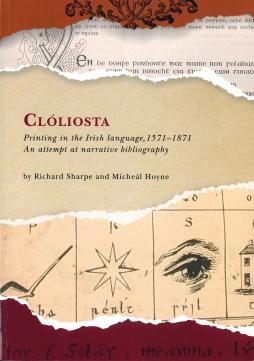
- Description
- Dublin, School of Celtic Studies-Dublin Institute for Celtic Studies, 2020 239x170 mm. xxxviii, 1253 pp. Softcover.
- language
- English

Clóliosta: Printing in the Irish language, 1571-1871
An attempt at narrative bibliography
Richard Sharpe and Mícheál Hoyne
Clóliosta is a catalogue of more than three centuries of printing in Irish, from the earliest instances of the language in print down to the eve of the modern revival. Entire books printed in Irish as well as pamphlets and other ephemera are described in detail. Information is provided on the Irish types used, on the background, content and reception of the works catalogued, and how they relate to the manuscript tradition. Every printing of every book was a publishing event. Looked at in sequence in Clóliosta, these events add up to larger stories about authors, publishers, printers, and readers. The history of printing in Irish is national and international, local and European. It begins with presses in Dublin, Louvain, Rome, London, and Paris. By the end of the eighteenth century provincial towns in Ireland were producing Irish books for Irish-speaking readers. Clóliosta allows us to tell stories about the Reformation and its aftermath, the rise of romantic nationalism and antiquarianism, the re-discovery of Ireland’s ancient literary monuments, and early efforts to stem and even reverse the decline of the language. The works catalogued in Clóliosta, in all their variety, allow us to tell a story of the Irish language very different from that built on the manuscript tradition alone.
